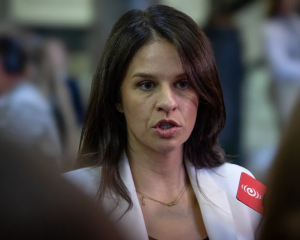Yesterday, Labour's employment, skills and training spokesman, Grant Robertson, said a Labour-led Government would spend $183 million to get those aged under 20 into work or training by the end of 2017.
The March-quarter household labour force survey found about 1000 people under 20 in Otago were unemployed and out of school or training.
A further 1700 people aged between 20 and 24 in Otago were in the same situation.
The youth unemployment rate in Otago was 8.2%, while the general unemployment rate was 5%.
Otago Chamber of Commerce chief executive John Christie said Labour's policies were ''pretty bold initiatives'' and bold moves were required to tackle the issue.
Mr Robertson said, as part of the package, Labour would implement ''Kick Start Apprenticeships'' in which employers would receive a $9100 subsidy - the equivalent of the dole - for offering apprenticeships to unemployed 18 and 19-year-olds.
Mr Christie said subsidised apprenticeships could be ''good for the country''.
''We have got a high proportion of young people who are currently unemployed and to get them into meaningful work would be really positive for community,'' he said.
It would also address some skill shortages in the economy.
''There are shortages in some of the skilled trades currently ... and to say 'rather than paying you to be on the unemployment benefit we will pay you to be in employment' is a far more productive way of spending the money.''
Anglican Family Support director Nicola Taylor also supported boosting apprenticeships.
''That's an area that's really shrinking away and resourcing in this way looks really promising,'' she said.
''Tertiary education isn't always the answer and these different career pathways really do need to be strengthened.''
It was particularly heartening to see policies that would tackle youth employment before it became a lifestyle, she said.
Young people wanted to work and apprenticeships gave them ''something to work towards that's achievable''.
Otago Southland Employers Association chief executive John Scandrett said he was supportive of yesterday's policy announcement, although it seemed to ''contradict the recently announced employment changes'' by Labour.
Other recent policy announcements by Labour ''would make it tough to broaden the prospects of employers taking on more younger workers'', he said.
''However, there is a definite requirement to raise the skill levels of our younger people and the Labour announcement does provide a level of comfort on the retention on a number of existing schemes that we believe are working well.''
Mr Robertson said: ''Labour is targeting the under-20s because, at that age, young people make critical decisions about their careers which can determine their pathway in life.
"Our Youth Employment Package will reach the 24,000 unemployed Kiwis under 20.''
Tertiary Education, Skills and Employment Minister Steven Joyce said Labour's policy ''largely follows the Government's ideas, only with a more expensive price tag''.
''Labour is proposing to take the most serious, hard-core repeat youth offenders on bush walks,'' he said.
''Other than that, Labour's policy is an almost exact mimic of what the Government's already doing.
''This is becoming a pattern for Labour. In these key policy areas, they simply haven't been doing the work so they don't know what is already going on.''
Associate Social Development Minister Chester Borrows said scrapping Macs, which take up to 40 of the most serious young offenders a year, would be a mistake.
The most recent results showed 79% of Mac graduates reduced their rate of offending.
Of those who did re-offend, 81% did so at a less serious level, including a 53% reduction in violent offending.
''No reoffending is acceptable, but anyone who thinks they have a magic solution to stop these young people offending entirely is dreaming,'' Mr Borrows said.
''These are some of our most serious young offenders, so any reduction in their future offending means fewer victims, and is a huge success.''
Youth crime had reduced by 30% since June 2011, he said.
- Additional reporting The New Zealand Herald













